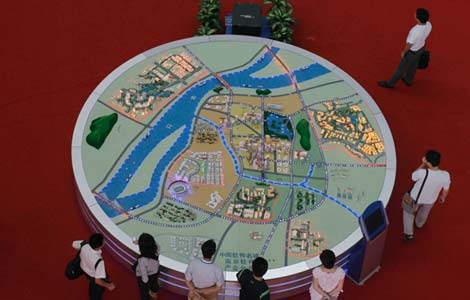Japanese clothing makers counter 'fast fashion'
Updated: 2013-06-24 15:26
(www.asianewsnet.net/The Yomiuri Shimbun)
|
||||||||
With the domestic apparel market shrinking, the industry has seen a series of restructuring moves in an effort to compete with large “fast fashion” firms such as Uniqlo Co. that offer cheap clothing manufactured in-house.
Point Inc., which owns the women’s clothing brand Lowrys Farm, plans to form a business integration in September with Tokyo-based clothing retailer Trinity Arts Inc. and Natural Nine Holdings, a Tokyo-based apparel maker that owns factories overseas.
Previously, most of Point’s products were made in emerging countries and acquired via trading companies. However, three years ago, the firm began making its own clothing overseas, and now produces about 20 per cent of its products. The business integration is aimed at bolstering this manufacturing structure and cutting costs.
Cross Company Inc., a second-tier clothing retailer based in Okayama that owns the earth music & ecology brand, in December acquired a midranking firm, Tokyo-based CAN Co., in a bid to become a major player in the industry with sales exceeding 100 billion yen (US$1.02 billion).
Cross Company began in-house production in 1999. “Buying CAN, which has a product line that resembles ours, will increase production efficiency,” said a Cross Company representative.
According to Recof Corp., a firm that advises companies on mergers and acquisitions, there were 31 apparel-related mergers and acquisitions in 2012, worth a combined 126.3 billion yen, the highest figure in the past five years.
This accelerated restructuring of the clothing industry is in response to a market that is rapidly shrinking due to the aging society, low birthrate and prolonged deflation. Yano Research Institute said the retail apparel market was worth 9.05 trillion yen in 2011, 12 per cent less than it was five years earlier.
The retail business model, inwhich firms stock and sell finished products designed by clothing makers, appears to be approaching its limit. Companies are increasingly unable to compete in terms of design or cost with large fast fashion firms, which have internal design and production departments, and can compile information on products that sell well and mass produce them in emerging countries.
Recently, a number of foreign fast fashion firms have entered the Japanese market, including Inditex of Spain, which operates the Zara chain, and Hennes & Mauritz AB, or H&M, of Sweden. Retailers are being pushed to increase in-house production to compete with these firms.
However, the business integration involving Point will only bring sales up to about 150 billion yen, which is still short of the 200 billion yen to 300 billion yen that is standard among midranked overseas fast fashion companies, indicating further restructuring of the industry may be coming.
Most Viewed
Editor's Picks

|

|

|

|

|

|
Today's Top News
China shares deepen downward spiral
Snowden exposes more US hacking, then flies
Xi vows bigger stride in space exploration
Mandela's condition critical
Suspect in shooting spree detained
Mountaineers killed in Pakistan
Foreign firms eye new 'opening-up'
Project halted due to bird nests
US Weekly

|

|















